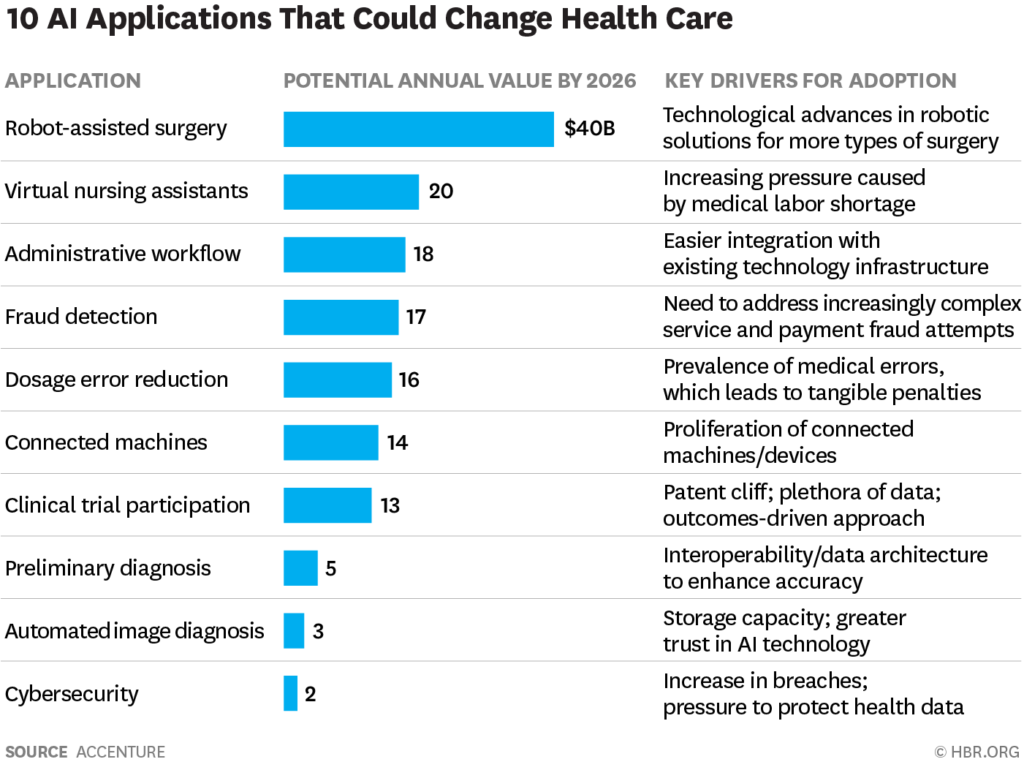What were the digital marketing trends around Industries using AI? As we research digital marketing it’s exciting to see technologies are transforming our lives and the way we do business, shop, travel, communicate, search and so much more. Our research shows too many to list so we start with the 8 Top Trends; AI Artificial Intelligence, Messaging; social messaging apps, Voice Search, Influencers, Mobile Responsive Design, Branding; cohesive syncing, Content; creating and curating, Live Streaming; broadcasting. You’ve been busy building your business. We’re here to connect the dots for you and catch you up on all things digital. Let’s talk AI, the topic of this article. What’s that all about? How does it benefit the business processes and people?
AI has already forever been changing these industries. It is not the technology of the future anymore, it’s the reality. And the industry is well-positioned for explosive growth as AI solutions are highly customizable to serve needs across industries. Some estimates suggest that the total global market for robots and artificial intelligence will reach ~$153 billion by 2020, and the adoption of these technologies could improve productivity by 30% in some industries. We found numbers from markets-and-markets where AI investments were at $3.94B in 2018.
The importance and impact of AI across industries are recognized by professionals researching, developing its capabilities and implementing it. Scientists from Stanford recently published a paper listing some of the industries that AI will transform or have a profound impact on. AI is no longer viewed as a breakthrough in Robots in manufacturing and warehousing but a reality. Some say it has even become mundane. I’m still thrilled about it.
What is AI?
Artificial intelligence uses machine learning to mimic human intelligence. The computer has to learn how to respond to certain actions, so it uses algorithms and historical data to help make predictions; like scoring leads.
Which industries are using AI?
- Healthcare and Medicine.
- Education.
- Marketing.
- Transportation
- Retail and e-commerce.
- Public relations (PR)
- Recruiting and HR
AI in Healthcare and Medicine
For healthcare and medicine, AI is helping automate processes for front desk receptionists at clinics to nurses assistants, nurses, doctors, surgeons, and those in specialized areas.

Robotics
Artificial intelligence robots assist with surgery, including heart, colorectal, and thoracic. Using robots to assist surgeons helps with higher accuracy, lower risk of infection, less blood loss, less pain, shorter hospital stay, and quicker recovery times. Robot-assisted surgery is an advancement concerned with patient wellness and overall recovery.
Electronic Healthcare Records
Electronic health record (EHR) technicians are using AI to help document, sort, and store records in digital form. This helps cut back on the time it takes EHRs to dig through years of patient information when speed and accuracy are vital. Additionally, digitized health records make it easier for patients to access their own information on a shared online health portal. It also helps with HIPAA compliance, fraud detection, and cybersecurity issues.
Using AI in Education
Edtech, or educational technology, is implementing technological resources to improve student learning as well as automate tasks for instructors.
Parent-teacher conferencing
AI-powers appointment scheduling software so that teachers and parents of K – 12 age kids can make time to meet when it works best for both parties.
Robotic student tutors and assistants
The AI Robot is changing Schools for Students with disabilities. Many classrooms have small tactile robots for students to interact with as a teaching assistant or tutor. These AI-fueled bots help younger students with reading, language learning, and social interactions. Children who are out sick are now able to attend classes remotely. This benefit prevents students from missing out on learning even while ill or indisposed.
Using AI in Marketing
Martech, marketing technology, is software improving marketing campaigns and strategies, and it’s currently being transformed by AI technology. No more endless hours of A/B testing and running different headline and description combinations to determine click-through rates. Google’s Responsive Search Ads can be used to compile results. Google AdWords will show different combinations, helping marketers to optimize headline-description combinations and broaden the reach for potential customers.
Data analytics
Data analytics, which is powered by machine learning, is essential for any AI-powered marketing solution. With potential customers, contacts from email lists, random site visitors, and those who register for one-off promotions such as webinars, marketers are swimming in rich, valuable customer data.
Using AI in Transportation
AI helps companies in the transportation industry to ensure the safety of the public by tracking crime data in real-time. Transportation can use AI in mission-critical tasks such as self-driving vehicles carrying passengers. AI is used to predict the paths of pedestrians and cyclists, it will decrease traffic accidents and injuries, allow for more diverse transportation usage and an overall reduction in emissions.
How is AI affecting Retail?
AI assists the retail industry by helping companies in marketing their items based on the consumer’s past purchases and search habits. Retailers realize that excellent customer service is critical to running a successful business. AI is helping make predictions making it useful in understanding the customer, personalizing the in-store customer experience and creating a more engaging business-to-consumer interaction. AI produces actionable information about a business, its customers, and the inventory which are not normally obvious or known to the business owner. With this information, a retailer can do a variety of things to benefit his own business.
AI is Helping Retailers Create a unique Customer Experience
 AI can help retailers get to know their customers, their preferences, and their behavior. AI allows you to know them so well that you know what they need and when they need it. And AI knows this before they do. Since AI is capable of producing such information on the fly, numerous benefits can be obtained immediately for the business – cash flow and the general experience. This information can be used to get the customer to buy more. If AI knows what they need before they do and issues them a coupon for a given product, this will trigger them to buy an additional item that they didn’t come for, generating extra revenue for the business.
AI can help retailers get to know their customers, their preferences, and their behavior. AI allows you to know them so well that you know what they need and when they need it. And AI knows this before they do. Since AI is capable of producing such information on the fly, numerous benefits can be obtained immediately for the business – cash flow and the general experience. This information can be used to get the customer to buy more. If AI knows what they need before they do and issues them a coupon for a given product, this will trigger them to buy an additional item that they didn’t come for, generating extra revenue for the business.
AI’s Plays a Key Role in Retail Product Layout
AI is key in deciding how best to physically layout items in the store. Sales data and machine learning can discover patterns in your customer’s buying preferences and learn what they buy together. Based on this, AI can provide you with suggestions on what items to put next to each other in your store to get your customers to purchase more. And since those suggestions are based on real data provided by real customers that are buying in a particular store, they are certainly guaranteed to deliver results and trigger your customers.
AI Helping Retailers Improve Inventory Turnover
Whatever part of your business, you can provide data for; AI can extract really valuable insights. This is like striking gold. It can be used to improve your inventory turnover, optimize your stock, predict future revenue, and helps price products competitively.
Using AI in Public relations (PR)
PR professionals are benefiting from AI as it provides audience insights, helping with predicting consumers’ wants and needs. This helps track trends in user data and make predictions based on their findings. AI can help companies shape their approach while creating targeted products and services based on what ML algorithms detect as “trending.”
Using AI in Social interactions
Using chatbots to reach out to consumers on social media is a trending way PR professionals can amplify their social reach. By communicating via chatbot software, brands can give automated responses to their audience. This helps brands keep an active social presence that can be monitored by a social media specialist as a means of cross-checking consumer-chatbot interactions.
Using AI in Recruiting and HR
Ziprecruiter is using AI technologies to help match the perfect candidate to the job description, then notifying the company looking to fill the position with the strongest person.
What are the disadvantages of using AI?
- One of the main disadvantages of AI is the high cost of creating, maintaining, and repairing of artificial intelligence. They are very complex machines and therefore available mostly to large retail chains. There are companies working to make it less expensive for smaller retailers.
- AI is unable to replicate humans. Humans get better with experience. AI does not.
- No Original Creativity
- Unemployment
Summary AI is Changing Success for Business
In summary, AI can be used for lead scoring, customer service, understanding what a customer buys, when they buy it, recommend other items they may like to buy, influence product layout, inventory turnover, how to optimize stock, create the customer experience, and predict future revenue.
The advantages in every industry far outweigh the disadvantages.
How can we help you with content marketing, driving traffic to your blog, are you marketing without a web strategy? Customer Service is available to take your call 781-996-9163.



 Carol is the founder of Hit-the-Web Marketing since 2009. She's been building websites and marketing campaigns from scratch into something scalable and successful for over 20 years.
We build websites around lead generating strategies. Then, we go to work driving traffic to your website, converting visitors into customers, and nurturing and retaining your customers. Our main service is Google Ads. Because 92.07% of people searching on the web use Google as their search engine of choice.
Carol is the founder of Hit-the-Web Marketing since 2009. She's been building websites and marketing campaigns from scratch into something scalable and successful for over 20 years.
We build websites around lead generating strategies. Then, we go to work driving traffic to your website, converting visitors into customers, and nurturing and retaining your customers. Our main service is Google Ads. Because 92.07% of people searching on the web use Google as their search engine of choice.